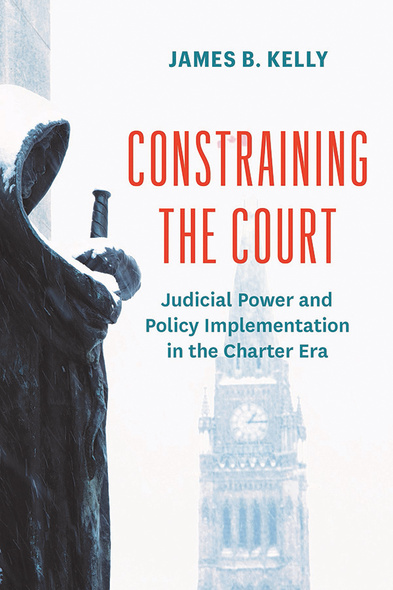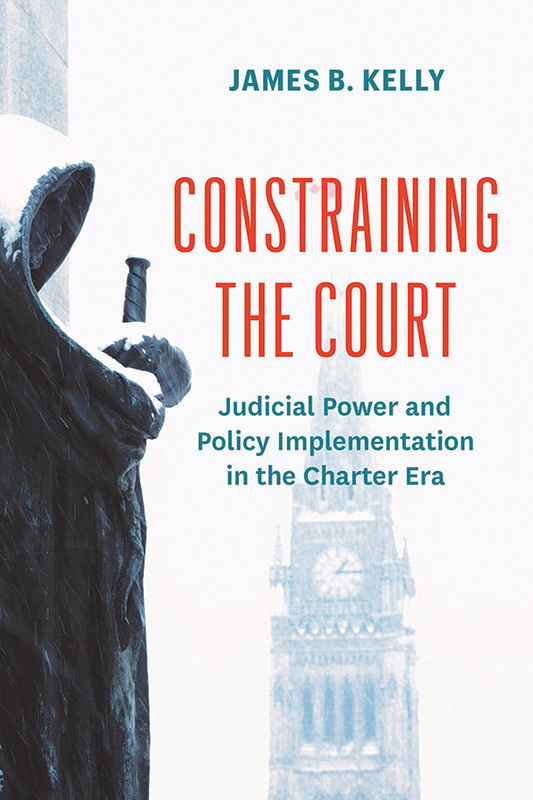
Constraining the Court
Judicial Power and Policy Implementation in the Charter Era
When the Supreme Court of Canada makes a decision that invalidates a statute, it creates a constitutional moment. But does that have a direct and observable impact on public policy? And how can a government respond if it disagrees with the highest court?
Constraining the Court explores what happens when a statute involving a significant public policy issue – French language rights in Quebec, supervised consumption sites, abortion, or medical assistance in dying – is declared unconstitutional. James B. Kelly examines the conditions under which Parliament or provincial and territorial legislatures attempt to contain the policy impact and engage in non-compliance without invoking the notwithstanding clause. He considers the importance of the issue, the unpopularity of a judicial decision with an incumbent government, the limited reach of a negative rights instrument such as the Charter, the context created by federalism and devolved authority, and the mixture of public and private action behind any legislative response to judicial invalidation.
While the Supreme Court’s importance cannot be denied, Constraining the Court argues that the policy impact of its rulings has at times been overstated. As this rigorous analysis convincingly concludes, a judicial decision does not necessarily determine a policy outcome.
This seminal work will sharpen understanding of the judicialization of politics not only for scholars and students of Canadian and comparative law and politics but also for public policy practitioners.
Constraining the Court is required reading for anyone trying to understand the policy impact of court decisions. Kelly's analysis of legislative and regulatory responses to court rulings is remarkably detailed and the case studies engaging and persuasive.
James Kelly's book offers a fresh and nuanced approach to understanding responses to Supreme Court decisions. It is essential reading for those wishing to understand the complex role of the Charter and the continued impact of federalism on policy-making.
In Constraining the Court, James Kelly argues that although the Supreme Court has the power to strike down legislation on Charter grounds, there is no guarantee that its decisions will reshape public policy. In his typically illuminating and incisive way, Kelly shows that the extent of courts’ 'policy impact' depends on a number of factors, including whether political actors agree with judicial decisions, federalism considerations, and even the behaviour of private actors. Constraining the Court is essential reading for anyone seeking a more nuanced picture of how the institutions of state interact under the Charter, how federalism shapes the political response to court rulings, and how major Supreme Court cases do – or do not – shape public policy.
James B. Kelly is a professor in the Department of Political Science at Concordia University. He is the author of Governing with the Charter: Legislative and Judicial Activism and Framers’ Intent, which was shortlisted for the 2005 Donner Prize. He served as the 2006–07 Seagram Chair in Canadian Studies at the McGill Institute for the Study of Canada, where he coedited Contested Constitutionalism: Reflections on the Canadian Charter of Rights and Freedoms with Christopher P. Manfredi. With Janet L. Hiebert, he is also a coauthor of Parliamentary Bills of Rights: The Experiences of New Zealand and the United Kingdom. He has been a visiting fellow at the Centre for Comparative Constitutional Studies at Melbourne Law School; a visiting professor at the Faculty of Law of Bar-IIan University, Israel; and an editor of the Canadian Journal of Political Science.
Introduction: Constraining the Court
1 Judicial Power and Policy Implementation in the Charter Era
2 Quebec and the Canadian Charter of Rights and Freedoms: Une province pas comme les autres
3 Minority Language Education Rights and the Charter of French Language: Plus ça change, plus c’est la même chose
4 Bridging Schools and the "Major Part Requirement": Designing and Implementing the 2010 Charter of the French Language
5 Quebec’s "Sign Law" and Freedom of Expression: Ford, Devine, and the Bourassa Government’s Response
6 Supervised Consumption Sites and the Respect for Communities Act: How the Harper Government Outflanked the McLachlin Court
7 The Opioid Crisis and Canadian Federalism: From Supervised Consumption to Overdose Prevention Sites
8 Physician-assisted Suicide to Medical Assistance in Dying: When Carter Met Federalism
Conclusion: Legislative Disagreements and Policy Implementation in the Charter Era
Appendix: Remedial Activism, 1982–2022 (Statutes, Ministerial Discretion, and Administrative Decisions)
Notes; Bibliography; Index









